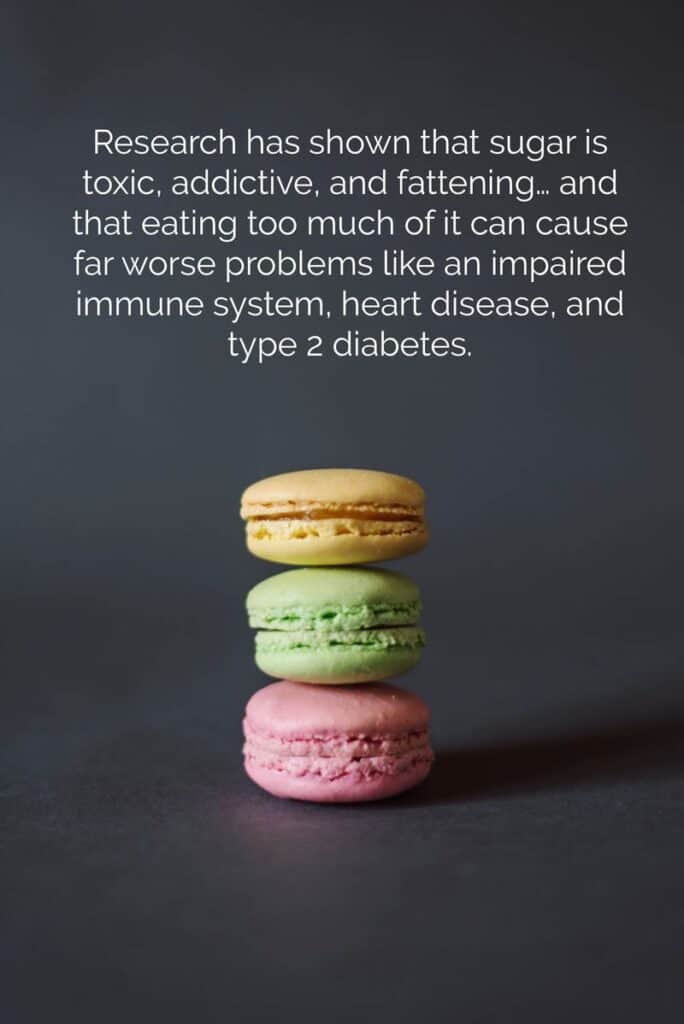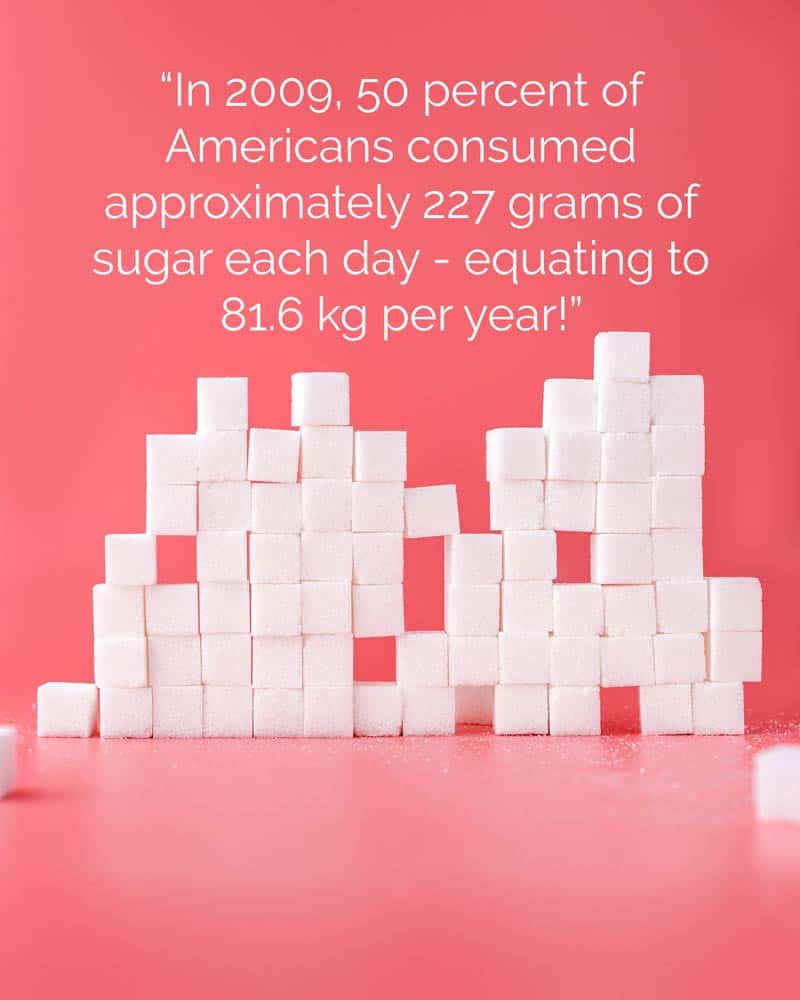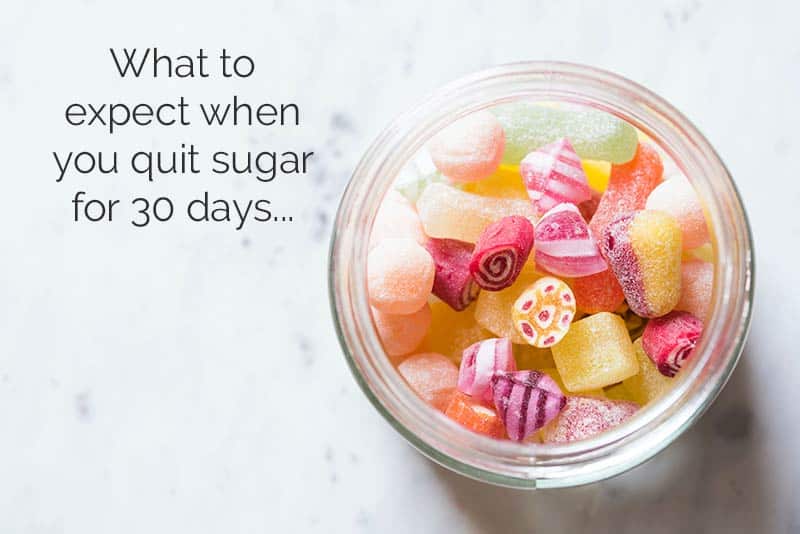What Will Happen When You Quit Sugar?
Sugar… It’s considered by many to be the worst thing you can eat, especially when it comes to maintaining metabolic health. Research has shown that sugar is toxic, addictive, and fattening… and that eating too much of it can cause far worse problems like an impaired immune system, heart disease, and type 2 diabetes.
So what will happen when you quit sugar for 30 days? We’ll get into that but first I feel it’s important to recognize that sugars aren’t necessarily all “bad”. At a fundamental level, sugars make up all carbohydrates, and carbohydrates as a whole shouldn’t be demonized. Quite the contrary; they can provide tremendous benefit, especially when it comes to fueling top tier performance.
In addition to being a great source of energy, carbohydrates provide many micronutrients including vitamins and minerals. Fruits and vegetables are superior choices of course but even moderate amounts of processed carbohydrates are safe for most. In saying this, we’re all unique and our tolerance for sugar is relative to factors such as genetics, temperament, and lifestyle. There are those among us who should likely eliminate sugar completely, and others who can consume moderate amounts frequently, without much detriment.

So what’s the problem with sugar?
Slowly but surely the world has begun to consume more sugar. It’s the over consumption that’s believed to cause metabolic diseases including diabetes, hypertension, lipid abnormalities, cardiovascular disease, nonalcoholic fatty liver disease, polycystic ovarian disease, cancer, and dementia.
In fact, in 1700, the average person consumed approximately 4.9 grams of sugar each day (1.81 kg per year).
In 1800, the average person consumed approximately 22.4 grams of sugar each day (10.2 kg per year).
In 1900, the average person consumed approximately 112 grams of sugar each day (40.8 kg per year).
In 2009, 50 percent of Americans consumed approximately 227 grams of sugar each day – equating to 81.6 kg per year!

How much is too much?
So how much is too much? Again, this depends on genetic disposition, lifestyle factors, and temperament. It’s impossible to put a firm number to it. What we can consider is the 80/20 rule and true moderation.
If you eat 4 times per day, 7 days per week, that’s 28 meals a week. Moderation of 20% would allow for roughly 6 of those meals to have some form of processed sugar. For the average person this would likely be fine. For those with low tolerance, poor lifestyle choices, and addictive personalities, this would likely be too much.
If you’re drinking a “special” coffee every morning, you’ve already surpassed what’s considered moderate consumption. Layer a snack bar on top and you’ve doubled your consumption of what’s considered moderate. You can see how easily this gets out of control.
Why do we continue to over consume sugar if we know how bad it is for us?
When you eat something loaded with sugar, your taste buds, gut, and brain all take notice. This activation of your reward system is similar to how our bodies process addictive substances such as alcohol or nicotine. An overload of sugar spikes dopamine levels and leaves you craving more. In other words, sugar is highly addictive! Perhaps rightfully so, in ancestral times it was a sought after nutrient that was hard to find. If you were fortunate enough to stumble upon some honey or berries, you could utilize that fuel for higher outputs of energy, a boost to your immune system, and improved chance of survival.
Naturally, the brain evolved to trigger the pleasure and reward centers of our brain when we found and consumed sugar.
Unfortunately, large food corporations know this all too well. They’ve come to realize massive profits by injecting sugar into virtually every processed food available. Additional sugar is placed in your bacon, in your salad dressings, and in your bread. Nowadays it’s hard to find a food that has more than 5 ingredients and doesn’t have added sugar. I encourage you to try. (For a list of 50+ hidden sugars and artificial sweeteners, click here)
But there’s good news! My studies have led me to believe that the reduction of refined sugars in your diet could not only prevent but possibly reverse many chronic diseases. Better yet, these metabolic changes have been proven to take place in as little as 9 days!
How to quit sugar?
So, what’s the best way to reduce your desire for sugar, allowing you to control yourself enough to only have it in moderation? By staying away from it entirely for a set period of time. This can help you kick the habit and break the addiction cycle.
Any sustained period of time is likely beneficial but 21-30 days will really help break the addictive cycle.
Ready to get started? Let’s prepare for what to expect.
What to expect when you quit sugar for 30 days:

When you quit sugar you can expect a host of benefits. Among others, you’ll likely lose weight, feel energized, reduce pain and inflammation, improve mental clarity, and rejuvenate metabolic health markers. Of course a host of other benefits are associated with moderate to no sugar intake. Here are 5 well documented effects of quitting sugar:
#1 Expect Withdrawals
According to a number of studies, when people quit eating sugar they describe symptoms of withdrawal and they also describe having strong food cravings. It’s likely you’ll be moody, grumpy, and irritable. Be prepared and forewarned.
Also keep in mind that you’ll probably be hit by sugar cravings pretty early on. Luckily, these cravings will disappear quickly! For most people it usually only takes three to five days for them to drop down significantly. Push through that desire to satisfy your sweet tooth because it will fade with a bit of time.
It’s also important to note that introducing refined sugar back in the diet too quickly can trigger relapse and binge eating. Again, everyone is unique, if you slip up early and begin to binge, don’t beat yourself up! Just know that you likely need a longer absence of sugar to break the habit.
#2 Expect Improved Energy and Metabolic Health
When you eat sugar you experience a rapid spike in your blood sugar levels. Soon after you’ll experience a rapid drop. This is known as a sugar crash or reactive hypoglycemia. When this happens it becomes difficult to focus and concentrate. You’re not as sharp or alert. All you want to do is take a nap on the couch.
Frequent doses of sugary foods are also correlated to hyperinsulinemia, which means the amount of insulin in your blood is higher than what’s considered normal. Over time this can lead to insulin resistance and a host of metabolic issues such as diabetes and chronic inflammation.
By avoiding sugar for 30 days you’ll no longer experience these highs and lows and you’ll find yourself with far more consistent energy levels. Perhaps more importantly, you’ll become more sensitive to insulin and benefit from decreased inflammation and metabolic health.
#3 Expect Improved Cardiovascular Health
Your cardiovascular health will also improve leading to a decreased risk of heart disease. A 2004 systematic review and meta analysis found that a higher intake of sugar was associated with an increased concentration of triglycerides in the blood. Increased total LDL levels were noticed as well which is also considered problematic by mainstream medicine. Finally, there was also an increase in blood pressure. To put it simply, reducing your sugar intake reduces your risk of heart disease!
In saying this, please keep in mind that optimizing your heart health isn’t just about quitting sugar. That’s a great start of course but it’s still also important to adopt other lifestyle habits that benefit your cardiovascular health. This includes things like exercising regularly, keeping stress levels low, and maintaining a healthy body weight.
#4 Expect Improved Skin
Poor diet can lead to a reduced elasticity of the skin and premature wrinkles, especially one with excess sugar and alcohol. Studies show that high blood sugar levels lead to the acceleration of a process known as glycation. In this process glucose and fructose link to the amino acids that are found in the collagen and elastin that support the skin. When this happens the skin cells become abnormal, stiff, discolored, and weak. Ultimately this shows up in the form of wrinkles, sagginess, and skin that simply looks older. It also makes the skin more vulnerable to UV light.
An additional change to your skin that you may notice is less acne. A study from the University of Colorado found that increased insulin levels may promote acne. As I’ve already mentioned, eating too much sugar will not only drastically spike insulin levels but it will also lead to insulin resistance which makes your body produce even more insulin, creating hyperinsulinemia.
#5 Expect Improved Body Composition
One of the most obvious things that you can expect to happen is weight loss. You can easily lose five or even ten or more pounds in less than a month just by quitting sugar.
Studies show that people who consume fewer drinks that have been sweetened with high fructose corn syrup have a reduced risk of being overweight.
There are many factors that are involved, the scope of which is too much for this blog post but know that moderate to low consumption of sugar is almost guaranteed to produce improved body composition.
In summary:
Remember sugar itself is not necessarily the enemy, it’s the over consumption of sugar that creates the problems. Sugar is highly addictive, cutting it for 30 days will help you break free from it’s addictive properties, improving your metabolic health, and hopefully, allow you to consume it in moderation going forward. If you would like our help, please fill out our request a consult form. Together we’ll create sustainable, long-term lifestyle goals that are inspired by your priorities.
Our professional coaches will help you reach your goals one step at a time.
No “quick fix” boot camps, no fad diets, no false timelines. At Rocky Point Fitness you’ll get a gym membership that you actually use and you’ll receive premium high end coaching support that has a track record for producing long-term results.
Fill out the form and request a free consultation today.
– Errol Clark, PPHC, CCFT, CF-L3
About the author:
Coach Errol Clark holds over 12 years of experience as a performance coach and has helped hundreds of clients lose weight, increase strength, improve function, and decrease pain in their lives.
Errol believes in continuing education and constant learning. He is one of the few trainers in North America to successfully complete the Crossfit L3 CCFT designation and the OPEX CCP coaching modules.
Errol specializes in behavioural change and has extensive knowledge in program design. He also has a refined skill set for improving the nuances of functional movement.







